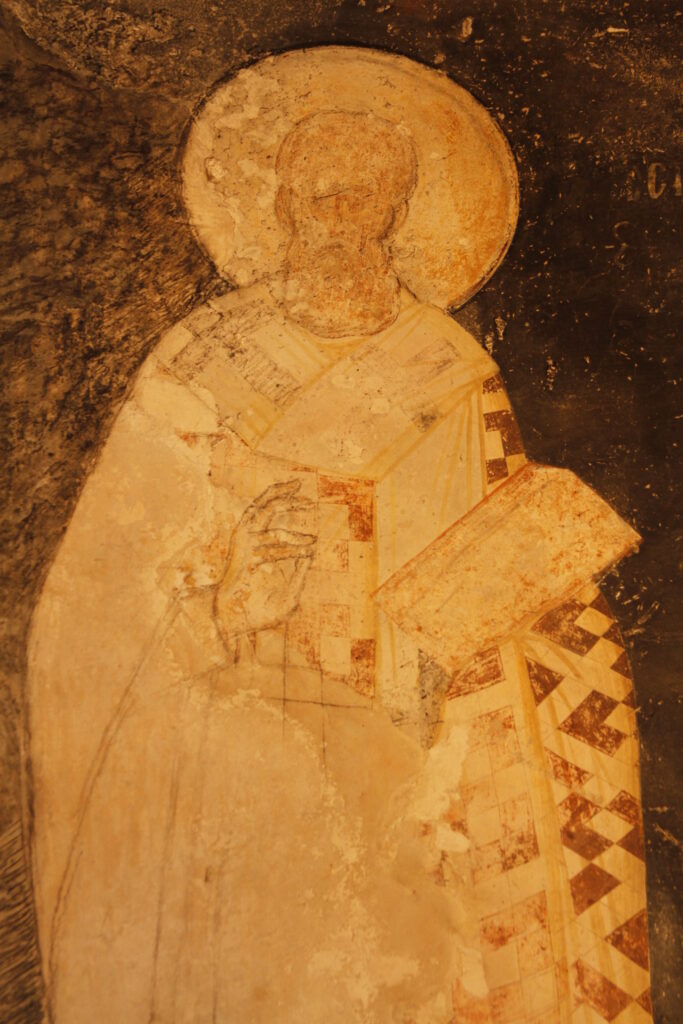Fr. Andrew Summerson, S.Th.D., is an Assistant Professor of Greek Patristics with the Sheptytsky Institute of Eastern Christian Studies in the Faculty of Theology in the University of St. Michael’s College.
History and Theology as Contemporary Wisdom from the Ancient Desert
In Athanasius of Alexandria’s 4th century “best seller,” Life of Anthony, we are told that upon his parents’ death, he begins soul-searching. An interior inquietude overtakes him and he starts to wonder about the writings of the New Testament. He ponders the apostles’ single-hearted mission to leave everything and follow Christ. He also considers the life of the early Church documented in Acts, where the company of believers laid everything at the apostles’ feet and put it in service of others (Acts 4:35). Anthony’s mental ruminations are confirmed one day in church, when he hears the proclamation of the Lord’s words to the rich man in the Gospel: “Sell everything you have and give to the poor” (Mt 19:21). With this, Anthony offloads his inheritance and takes to the desert. He learns from elder ascetics, practices prayer unceasingly, wrestles with the devil, keeps vigil in caves, heals the sick, and confutes philosophers.
Athanasius explains that Anthony, “a man in the flesh,” is assisted in all these efforts by the “Lord who for our sakes became flesh.” This is a rather loaded statement that needs untangling. Athanasius, the writer of the Life of Anthony, is also one of the greatest theological minds of the early Church, who forcefully defended the faith articulated at Nicaea in 325. The council aimed to narrate precisely who is this “Lord who for our sakes became flesh.” This Lord is of one substance (homoousios) with the Father, a detail still recited every Sunday in the Nicene Creed today, or in the Byzantine tradition, to which I belong, it is sung at every Divine Liturgy.
What is at stake for Athanasius in this doctrinal battle is not simply an ethereal philosophical dispute about the nature of God but rather the accurate reception of God’s revelation to us “according to the Scriptures.” Nicaea means the difference between worshiping a false idol or worshiping the living God, who providentially connects the dots between Anthony’s initial interior stirrings and the public proclamation of the Gospel. The Life of Anthony details the process of the ascetic’s transformation from a quiet kid to a heroic saint, “initiated in the mysteries and filled with the spirit of God.”
Nicene theology creates the conditions for more Anthonys to spring forth in this world. Anthony has internalized Nicaea and proclaims it in his own flesh. If Jesus is a human creature, he is no more than a model to imitate. On the other hand, if Jesus is God who takes on a human nature, he offers human nature a new possibility: to bear “all the fullness of God” (Eph 3:19).
Perhaps Athanasius’ greatest contribution as a theologian is his ability to bridge the gap between the heights of doctrinal controversy and grassroots spirituality. As a historical theologian, I specialize in gaps, particularly gaps between the past and the present. My principal sources are figures from the first millennium. I engage them precisely because it is here, in the cauldron of the first millennium, the language for naming God’s activity in Scripture is formulated for ages to come. These writers developed a grammar that Christians are heirs to. Truthfully, one can speak a language without knowing the grammar. Infants surely begin to formulate sentences long before they can diagram the contents of their principal parts. But learning grammar shows us the sheer power of language, exposing the heights and depths of what words can do when used to their full potential. For us, the grammar of the Nicene Creed may just be a common place prayer that is muttered through Mass. For Athanasius, the creed is the very condition that provides a way for saints to emerge in this world, charged with the power that comes from “the Lord who was made flesh.”
We are continually tempted to forget how we learned Christian language. In our own speaking, we lean on clichés, phrases coined by others so often repeated they have lost their meaning. Such repetition excuses us from the burden of thinking. One must not forget that clichés come about in the first place because they are powerful statements that conjure up popular agreement and therefore are worth repeating. Studying the sources of Christian language ensures that the truths of the faith do not become vacuous statements but remain powerful and transformative. When properly interrogated, reading the texts of the ancient dead ensures that we can hear them as clearly as Anthony did the Scriptures. Historical theology aims at the same results. Without access to these sources, we cut the Christian tradition short. We miss the power of its language, capable of cultivating Anthonys, whose life captivated a 4th century crowd and is worth the hard work of making sense of in the 21st.
Read other InsightOut posts.


